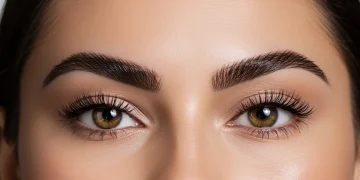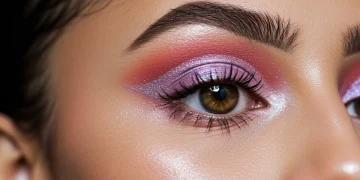The Latest Anti-Aging Ingredients: What’s Worth the Hype in 2025?

Advertisements
Discover the cutting-edge anti-aging ingredients set to dominate the skincare landscape in 2025, from scientifically-backed peptides to novel botanical extracts, and understand which ones truly deliver on their promises for youthful, radiant skin.
As we approach 2025, the quest for eternal youth continues to fuel innovation in the skincare industry. But with so many products and ingredients vying for our attention, it’s crucial to separate fact from fiction. This article dives into the latest anti-aging ingredients: what’s worth the hype in 2025?, providing a comprehensive guide to the most promising advancements.
Advertisements
Understanding the Science of Aging
The aging process is a complex interplay of genetic, environmental, and lifestyle factors. Understanding these underlying mechanisms is crucial for developing effective anti-aging strategies.
The Key Processes Behind Aging
Several biological processes contribute to the visible signs of aging. These include cellular senescence, reduced collagen production, and oxidative stress.
Cellular senescence refers to the state where cells stop dividing, accumulating in tissues and releasing inflammatory factors that damage surrounding cells. Reduced collagen production leads to wrinkles and loss of skin elasticity. Oxidative stress, caused by free radicals, damages cellular structures.
Environmental Impacts on Skin Aging
Environmental factors also play a significant role in aging. Sun exposure, pollution, and smoking can accelerate the breakdown of collagen and elastin, leading to premature aging.

Protecting the skin from sun damage is one of the most effective ways to slow down the aging process. Using sunscreen daily, even on cloudy days, can significantly reduce the risk of premature aging.
- Sunscreen use is essential to protect from UVA and UVB rays.
- Antioxidants help neutralize free radicals caused by pollution.
- A healthy lifestyle, including a balanced diet and regular exercise, supports overall skin health.
By understanding the science behind aging, we can make informed decisions about the skincare ingredients and treatments that are most likely to be effective. Next, we will look at the promising ingredients to watch in 2025.
Peptides: The Building Blocks of Youth
Peptides are short chains of amino acids that act as signaling molecules in the skin. They can stimulate collagen production, reduce inflammation, and improve skin elasticity.
How Peptides Work
Peptides work by sending signals to cells, encouraging them to perform specific functions. For example, some peptides signal fibroblasts to produce more collagen, while others reduce inflammation.
Different types of peptides target different skin concerns. Copper peptides, for instance, promote wound healing and collagen synthesis, while neuropeptides can reduce the appearance of wrinkles by relaxing facial muscles.
The Latest Peptide Innovations
Researchers are continuously developing new and improved peptides with enhanced efficacy and stability. Some of the most promising innovations include peptides that target specific aging pathways and peptides that are better able to penetrate the skin barrier.

One exciting area of research is the development of peptides that can protect against environmental damage. These peptides can help to neutralize free radicals and prevent the breakdown of collagen and elastin.
- Matrixyl 3000 stimulates collagen production and reduces wrinkles.
- Argireline relaxes facial muscles to minimize the appearance of expression lines.
- Copper peptides promote wound healing and collagen synthesis.
Peptides represent a powerful tool in the fight against aging. With ongoing research and innovation, peptides are poised to play an even more significant role in skincare routines in the coming years. In the next section, we will explore the role of retinoids.
Retinoids: The Gold Standard in Anti-Aging
Retinoids, derivatives of vitamin A, are among the most well-researched and effective anti-aging ingredients. They work by increasing cell turnover, stimulating collagen production, and reducing inflammation.
The Power of Retinoids
Retinoids have been shown to address a wide range of skin concerns, including wrinkles, fine lines, acne, and hyperpigmentation. They help to improve skin texture, tone, and overall appearance.
Different types of retinoids are available, ranging from over-the-counter retinol to prescription-strength tretinoin. While retinol is less potent, it can still deliver significant benefits with consistent use.
Advancements in Retinoid Technology
Researchers are continually working to improve the efficacy and tolerability of retinoids. Some of the latest advancements include encapsulated retinoids, which provide a slow and steady release of the ingredient, reducing the risk of irritation.
Another promising area of research is the development of retinoid alternatives, such as bakuchiol, which offer similar benefits without the potential side effects of traditional retinoids.
- Retinol increases cell turnover and stimulates collagen production.
- Tretinoin is a prescription-strength retinoid that delivers powerful anti-aging effects.
- Bakuchiol is a natural alternative to retinoids with similar benefits.
Retinoids remain a cornerstone of anti-aging skincare. With ongoing advancements in retinoid technology, consumers can now enjoy the benefits of these powerful ingredients with less irritation. Now, let’s explore the exciting world of antioxidants.
Antioxidants: Protecting Against Environmental Damage
Antioxidants are substances that neutralize free radicals, unstable molecules that can damage cells and contribute to aging. Incorporating antioxidants into your skincare routine can help to protect against environmental damage and promote youthful skin.
Why Antioxidants are Important
Free radicals are generated by exposure to sun, pollution, and other environmental stressors. Antioxidants work by donating electrons to free radicals, neutralizing them and preventing them from causing damage.
Many different types of antioxidants are available, each with its own unique properties and benefits. Some of the most popular antioxidants include vitamin C, vitamin E, and green tea extract.
Novel Antioxidant Discoveries
Researchers are constantly discovering new and potent antioxidants with enhanced protective abilities. One exciting area of research is the development of antioxidants that can target specific types of free radicals and penetrate deep into the skin.
Another promising innovation is the use of antioxidant blends, which combine multiple antioxidants to provide comprehensive protection against environmental damage.
- Vitamin C brightens the skin and protects against UV damage.
- Vitamin E hydrates the skin and neutralizes free radicals.
- Green tea extract reduces inflammation and protects against sun damage.
Antioxidants are an essential component of any anti-aging skincare routine. By incorporating a variety of antioxidants into your regimen, you can protect your skin from environmental damage and maintain a youthful appearance. Next, we’ll explore the role of growth factors in skincare.
Growth Factors: Stimulating Cellular Repair
Growth factors are naturally occurring proteins that regulate cellular growth, proliferation, and differentiation. In skincare, growth factors can help to stimulate collagen production, promote wound healing, and improve skin elasticity.
The Science Behind Growth Factors
Growth factors work by binding to receptors on the surface of cells, triggering a cascade of events that lead to cellular repair and regeneration. They can help to repair damaged skin, reduce wrinkles, and improve overall skin health.
Different types of growth factors target different skin concerns. Epidermal growth factor (EGF), for instance, stimulates the growth of new skin cells, while transforming growth factor (TGF) promotes collagen synthesis.
Innovations in Growth Factor Technology
Researchers are continuously working to improve the delivery and efficacy of growth factors. One exciting area of research is the development of encapsulated growth factors, which are protected from degradation and can penetrate deeper into the skin.
Another promising innovation is the use of plant-derived growth factors, which offer a more sustainable and ethical alternative to animal-derived growth factors.
- Epidermal growth factor (EGF) stimulates the growth of new skin cells.
- Transforming growth factor (TGF) promotes collagen synthesis.
- Fibroblast growth factor (FGF) stimulates the production of collagen and elastin.
Growth factors represent a powerful tool for stimulating cellular repair and regeneration. With ongoing advancements in growth factor technology, consumers can expect to see even more effective and targeted skincare products in the years to come. Now, we’ll investigate the potential of plant-based ingredients.
Plant-Based Actives: Harnessing Nature’s Power
Plant-based actives are derived from natural sources, such as fruits, vegetables, and herbs. Many plant extracts possess potent antioxidant, anti-inflammatory, and collagen-boosting properties, making them valuable additions to anti-aging skincare routines.
The Benefits of Plant-Based Ingredients
Plant-based ingredients offer a wide range of benefits for the skin. They are often rich in antioxidants, vitamins, and minerals, which can help to protect against environmental damage, reduce inflammation, and improve skin hydration.
Some of the most popular plant-based actives include green tea extract, resveratrol, and hyaluronic acid. These ingredients have been shown to deliver significant anti-aging benefits without the potential side effects of synthetic ingredients.
Emerging Plant Extracts for Anti-Aging
Researchers are continually discovering new and exciting plant extracts with powerful anti-aging properties. One promising area of research is the study of adaptogenic herbs, which can help the skin to adapt to stress and maintain its natural balance.
Another exciting innovation is the use of stem cells derived from plants, which can stimulate cellular regeneration and promote youthful skin.
- Green tea extract is rich in antioxidants that protect against sun damage.
- Resveratrol is a potent antioxidant that reduces inflammation and protects against cellular damage.
- Hyaluronic acid is a natural moisturizer that plumps the skin and reduces the appearance of wrinkles.
Plant-based actives provide a natural and effective way to combat the signs of aging. With ongoing research and innovation, we can expect to see even more powerful and targeted plant-based skincare products in the future. Finally, let’s wrap things up with our conclusion.
| Key Point | Brief Description |
|---|---|
| 🧪 Peptides | Boost collagen, reduce inflammation, and improve skin elasticity. |
| ⭐ Retinoids | Increase cell turnover, stimulate collagen, and reduce wrinkles effectively. |
| 🛡️ Antioxidants | Protect skin from free radicals, preventing damage and premature aging. |
| 🌿 Plant-Based Actives | Offer natural antioxidants and anti-inflammatory benefits for healthier skin. |
FAQ
▼
Skin aging is primarily caused by a combination of factors, including genetics, environmental exposure (such as UV radiation and pollution), lifestyle choices (like smoking and diet), and natural biological processes that reduce collagen production.
▼
Retinoids work by accelerating skin cell turnover, increasing collagen production, and reducing inflammation. This helps to diminish the appearance of wrinkles, fine lines, and uneven skin tone, leading to smoother, more youthful skin.
▼
Antioxidants protect the skin by neutralizing free radicals caused by environmental factors like sun exposure and pollution. This prevents oxidative stress, which can lead to premature aging, wrinkles, and other signs of skin damage.
▼
Yes, many plant-based ingredients offer effective anti-aging benefits. They often contain potent antioxidants, vitamins, and minerals that help protect and nourish the skin, reducing the signs of aging in a natural and gentle way.
▼
For sensitive skin, peptides and plant-based ingredients like aloe vera and chamomile are often recommended. These ingredients are generally less irritating than retinoids and can still provide significant anti-aging benefits while soothing and calming the skin.
Conclusion
As we look towards 2025, the world of anti-aging skincare is brimming with innovative ingredients and technologies. From the proven power of retinoids and peptides to the emerging potential of plant-based actives and growth factors, consumers have more options than ever to address their specific skin concerns and achieve a youthful, radiant complexion.





